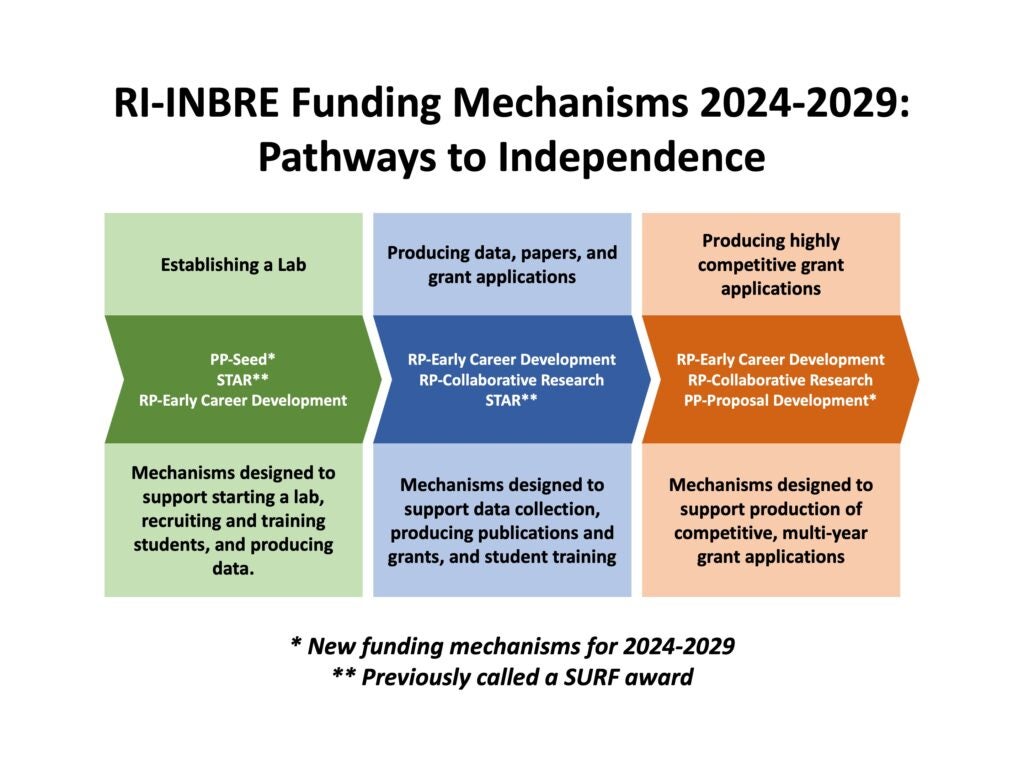The primary mission of the RI-INBRE DRPP is to solicit proposals and award research grants to biomedical research to investigators at all RI-INBRE network institutions. We offer a variety of funding mechanisms primarily focused on supporting the research career development of early career investigators at the network institutions. We fund a very broad range of biomedical research projects that impact human health.
A key feature of our developmental funding mechanisms is a mentorship model that helps early career investigators establish a research program that meaningfully integrates student training, moves research projects from conception to publication, and become competitive for extramural funding. RI-INBRE investigators select an established faculty mentor who can provide scientific and career guidance during the award period and beyond. Mentors have scientific expertise that overlaps with the mentee’s research topic and provide expert guidance on scientific direction, manuscript development and publication, and grant development and submission.
Research Project recipients also participate in an annual mentoring meeting run by one of our External Mentoring Consultants, successful faculty members from PUI institutions outside RI. This provides an excellent opportunity to discuss progress and coordinate support of investigators as they develop their research program.
The RI-INBRE DRPP award mechanisms are designed to scaffold pathways to establishing a sustainable, independent research program.

Award mechanisms for the 2024-2029 period include:
Pilot Projects (PP):
Pilot Project – Seed (PP-Seed): Award supports 1st and 2nd year PUI investigators who are establishing their labs and building critical research capacity. This award supplements institutional startup funds and provides faculty salary support, support for one summer research student (required), and purchase of equipment and supplies. Budget: up to $25,000 in direct costs for one year. Please consult the FOA. (Proposal Form)
Pilot Project – Proposal Development (PP-PD): Award supports PUI investigators who are ready to write or are writing an independent, multi-year grant proposal. PP-PD awardees are expected to be well-positioned to write a multi-year proposal. Funds may be used to support activities that will result in submission of an extramural grant application during the year of the PP-PD award. Budget: up to $50,000 per year in direct costs for one year. Please consult the FOA. (Letter of Intent Form)
Research Projects (RP):
PUI Early Career Development (PUI-ECD): Award supports the early career development of early career faculty at network primarily undergraduate institutes (PUIs) – Bryant University, Providence College, Rhode Island College, Roger Williams University, Salve Regina University, and Johnson and Wales University. The award provides funding for a research program that is established and building to submission of competitive multi-year extramural funding proposals. The ECD award requires training of three summer research students. Budget: up to $100,000 in direct costs per year for two years. Please consult the FOA. (Letter of Intent Form)
URI/Brown Early Career Development (UB-ECD): Award promotes the research career development of early-stage investigators at URI or Brown University who are committed to establishing a competitive externally-funded biomedical research program. Investigators are expected to develop a productive and sustainable student research training program and train at least three students. Budget: up to $100,000 per year in direct costs for up to two-years. Please consult the FOA. (Letter of Intent Form)
PUI Collaborative Research (CR): Award supports collaborative biomedical research between an investigator at a primarily undergraduate institution (PUI) and an established investigator from the University of Rhode Island (URI) or Brown University (Brown). The program is designed to accelerate the research progress of the PUI investigator by active collaboration with an experienced investigator and mentor and is expected to strengthen research skills and productivity while increasing the level of preparedness of the PUI investigator for submission of competitive multi-year extramural funding proposals. The award provides funding for and requires training of three summer students by the PUI faculty member. Budget: up to $100,000 in direct costs per year for two years for the PUI investigator and up to $30,000 in direct costs for the collaborative mentor. Please consult the FOA. (Letter of Intent Form)
Other Funding Mechanisms for Investigators
Student Training and Research (STAR): Award for faculty at primarily undergraduate institutions (PUIs) provides intensive summer biomedical research opportunities for undergraduate students. PUI STAR mentors are required to provide research training to three undergraduate students in their laboratories during the 10-week summer STAR program. Budget: up to $30,000 in direct costs for one year, which includes support for three students, equipment and supplies, and up to $8,000 faculty summer salary. Please consult the FOA. (Proposal Form)
Teaching Postdoctoral Fellows (TPF) Program: Award launches the teaching and research careers of talented postdoctoral research fellows in PUI labs. TPFs contribute significantly to the faculty mentor’s research program and play an active role in undergraduate student research training, present their research findings at regional and/or national meetings, publish their research findings in peer-reviewed journals, assist with grant writing, and participate in RI-INBRE program activities and professional training. Budget: RI-INBRE will fund up to 50% of the salary and fringe benefits of the TPF for 2 years (following the NIH postdoc salary scale), with the remaining support coming from the PUI and/or external funding sources. Please consult the FOA.
CCRI Faculty Fellowship Program: Provides funds for multiple award mechanisms to boost teaching, curriculum, and research development for CCRI faculty and students. Includes awards for CCRI faculty to undertake developmental research at another RI-INBRE network institution, develop research-based curriculum, or purchase capacity-building equipment for research and teaching. Budget: please consult the FOA.
The RI-INBRE New England Institute of Technology Training Award Program: Provides funding for two opportunities, including a Student Training Award and a Sabbatical Training and Curriculum Development Award. Outcomes of this funding are expected to include augmenting NEIT’s biomedical research infrastructure and enhancing NEIT curricula with faculty/students experimenting with learning models. The NEIT-STAR Fellowship program aims to support faculty with an active research program to mentor students who are actively performing research with that investigator. This award mechanism is meant to provide up to three students with a minimum of 10 weeks of intensive, hands-on research training experience. The NEIT Sabbatical Training and Curriculum Development Award’s goal is to provide sabbatical-eligible faculty with a professional development opportunity during their faculty sabbatical to incorporate biomedical research content into their courses and stimulate establishing a research program that involves student training. Budget: please consult the FOA.
Since its inception in 2001, RI-INBRE has had a transformative impact on the biomedical research infrastructure in Rhode Island. RI-INBRE continues to evolve and grow as we work with our current and future partners to best support biomedical development in the state.Brett Pellock, RI-INBRE Program Coordinator

